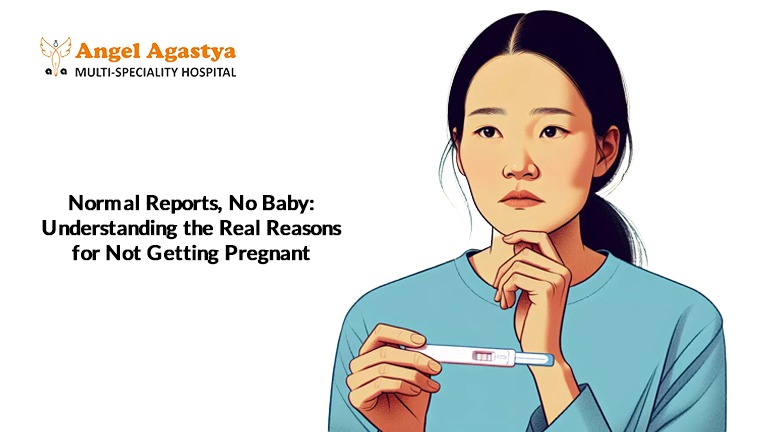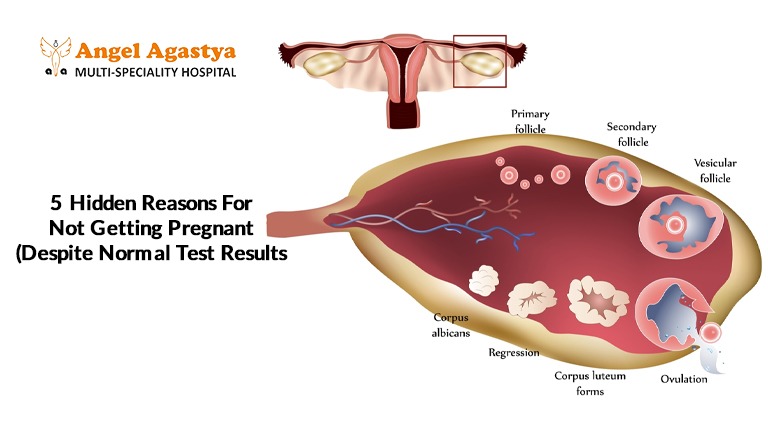
The journey to parenthood is often envisioned as a joyous, natural progression. For many couples, however, it becomes an emotionally taxing and frustrating ordeal, particularly when they’ve been trying to conceive for months, or even years, only to be met with the baffling news that all their initial medical reports are “normal.” This feeling of being adrift, of having no clear answer for why you’re not getting pregnant even if reports are normal, can be disheartening and isolating.
Top 5 Reasons Why You’re Not Getting Pregnant Even If Reports Are Normal
This blog post is dedicated to offering hope and shedding light on these often-overlooked and subtle reasons for not getting pregnant even when the initial diagnostic picture seems clear. We understand the emotional toll this uncertainty takes, and we’re here to explore factors that might lie beyond the scope of routine fertility testing, providing clarity and direction for your next steps.
Understanding these nuanced reasons for not getting pregnant is the first step toward finding a path to parenthood.
The Baffling Normal: Understanding “Unexplained Infertility”
In the world of fertility, “unexplained infertility” is a term doctors use when regular fertility tests don’t show any clear reason why a couple isn’t able to get pregnant. This usually applies when a woman under 35 has been trying to conceive for a year, or if a woman over 35 has been trying for six months.

The common tests done include:
For Women:
- Checking if she is ovulating (with blood tests for hormones like FSH, LH, Estradiol, and Progesterone, or using ovulation prediction kits)
- Looking at the health of the uterus through an ultrasound
- Making sure the Fallopian tubes are open by doing a special X-ray test called HSG (Hysterosalpingogram)
For Men:
- A semen analysis to check sperm count, how well the sperm move (motility), and if they look normal (shape)
When all these test results come back as “normal,” it can feel very confusing and frustrating. But it’s important to know that just because test results look normal, it doesn’t mean everything is perfect. It only means that the usual tests didn’t find anything wrong.
There might still be reasons for not getting pregnant, they’re just harder to see. That’s why a deeper look into other, less obvious factors might be needed to understand what’s really going on.
5 Hidden Reasons For Not Getting Pregnant (Despite Normal Test Results)

When your fertility tests come back normal but pregnancy still isn’t happening, it can be incredibly frustrating. This is where deeper, more hidden factors come into play. Let’s explore the top 5 reasons for not getting pregnant that often go unnoticed in standard tests.
1. Hidden Ovulation Problems
Even if your tests say you’re ovulating, there could still be issues behind the scenes.
Inadequate Luteal Phase : Sometimes, the time after ovulation (called the luteal phase) is too short or doesn’t make enough progesterone. This can prevent the uterus from being ready for a fertilized egg to implant.
Poor Egg Quality : Age plays a role, but even younger women can have poor egg quality due to stress, lifestyle, or genetics. This can affect fertilization or embryo development — even if hormones look fine on paper.
Mild or Atypical PCOS : Some women may have a subtle form of PCOS (like “lean PCOS”) where cycles seem regular, but ovulation is still weak or irregular. In some cases, women may also have diminished ovarian reserve (fewer eggs than expected) even if their hormone levels appear normal.
2. Silent Endometriosis
Endometriosis is one of the more overlooked reasons for not getting pregnant, especially in its milder form where symptoms aren’t obvious.
What Is Silent Endometriosis?
It’s a condition where tissue similar to the uterine lining grows outside the uterus often without the usual pain or heavy periods.
How It Affects Fertility:
- Inflammation: Creates a toxic environment for sperm, eggs, and embryos.
- Adhesions/Scar Tissue: Can disrupt how the egg and sperm meet or how the embryo travels.
Biochemical Changes: Makes the pelvic area less friendly for pregnancy, something that basic tests can’t detect.
Diagnosis often requires a minor surgery called laparoscopy.
3. Advanced Sperm Issues
Many couples assume everything is fine when the semen analysis is normal but there’s more to sperm health than count and movement.
Sperm DNA Fragmentation : Even if sperm seem healthy, their DNA might be damaged. This can prevent proper fertilization, or cause early miscarriages. A DNA fragmentation test is needed to detect this.
Undetected Shape or Function Issues : Some defects in sperm structure or function can go unnoticed in basic tests but still prevent fertilization.
Sperm Antibodies : In rare cases, the immune system may attack sperm, affecting their ability to move or fertilize the egg. This also requires special testing beyond the usual semen analysis.
4. Fallopian Tube Issues (That Don’t Show on HSG)
You might have been told your tubes are open (patent) after an HSG test, but there can still be tube-related reasons for not getting pregnant.
Ciliary Dysfunction : Tiny hair-like structures (cilia) inside the tubes help move the egg. If they aren’t working properly (maybe due to old infections), the egg can get stuck or not reach the sperm.
Subtle Scarring or Inflammation : Past infections like Chlamydia can leave minor scars that interfere with sperm or egg movement — even if there’s no full blockage.
Hidden Hydrosalpinx: Sometimes, a small amount of fluid collects in a fallopian tube that’s not easily seen. This fluid can flush out the embryo or create a toxic environment, stopping implantation.
5. Lifestyle and Environmental Factors
These are among the most underestimated reasons for not getting pregnant, as they don’t show up in medical reports but can strongly affect your fertility.
Chronic Stress : Long-term stress can disturb your hormones, mess with ovulation, and lower sperm quality.
Nutrient Deficiencies : Low levels of key nutrients like Vitamin D, B12, or iron can affect egg and sperm quality.
Environmental Toxins : Exposure to chemicals in plastics, cosmetics, or cleaning products can disturb your hormones and reproductive system.
Body Weight and Exercise : Being underweight, overweight, or doing too much intense exercise can all impact hormone levels and ovulation.
Smoking, Alcohol, and Caffeine : High amounts of these substances can lower the chances of conception and affect egg, sperm, and embryo health.
If you’re struggling to conceive despite “normal” test results, don’t lose hope. There may be hidden reasons for not getting pregnant that need more advanced testing or a fresh look at your lifestyle. Consider talking to a fertility expert who can dig deeper into these subtle issues and guide you toward the next steps.
The Next Steps: When “Normal” Isn’t Enough
Facing “unexplained infertility” can be incredibly frustrating, but it is by no means a dead end. It is a critical juncture where perseverance and a deeper investigation into the underlying reasons for not getting pregnant become paramount.
The next crucial step is to seek consultation with a specialized fertility expert, often a Reproductive Endocrinologist. These specialists are equipped to delve beyond standard test results, offering a more nuanced and comprehensive approach. They can recommend advanced diagnostic tests, such as:
- Advanced Sperm Analysis: Including DNA fragmentation testing and specialized morphology assessment.
- Hormonal Panels: More detailed evaluations of reproductive hormones throughout the cycle.
- Diagnostic Laparoscopy: Often considered the “gold standard” for diagnosing silent endometriosis and assessing pelvic anatomy.
- Endometrial Receptivity Analysis (ERA): To assess if the uterine lining is receptive to implantation at the optimal time.
Understanding these deeper reasons for not getting pregnant is not just about finding a label; it’s about uncovering the specific challenges that can then be addressed with targeted, personalized treatment strategies. These might include lifestyle modifications, specific medications, minimally invasive surgeries (like for endometriosis), or advanced reproductive technologies like IUI (Intrauterine Insemination) or IVF (In Vitro Fertilization).
Don’t Let “Normal” Reports Stop You – Find Answers at Angel Agastya Hospital, Delhi
Suppose you’ve been grappling with the profound frustration of “unexplained infertility” and are actively seeking a deeper understanding of the often-subtle reasons for not getting pregnant. In that case, Angel Agastya Hospital in Delhi is here to offer specialized support. At Angel Agastya, we truly understand the emotional and medical complexities that arise when initial reports are frustratingly normal, yet the dream of conception remains elusive.
Our advanced gynecology and comprehensive infertility treatments are specifically designed to delve beyond standard tests, offering cutting-edge diagnostics and highly personalized approaches to meticulously uncover even the most subtle reasons for not getting pregnant. Our team of compassionate and experienced fertility specialists utilizes state-of-the-art techniques and provides unwavering support, guiding you through every intricate step of your unique journey towards parenthood, from advanced sperm analysis to minimally invasive surgical procedures that can resolve underlying issues.
Conclusion
A “normal” fertility report, while initially perplexing, should never be interpreted as a dead end on your path to parenthood. Instead, it signals the need for a more thorough, in-depth investigation into the less obvious reasons for not getting pregnant.
Empower yourself by being proactive, seeking specialized help from a dedicated fertility expert, and exploring these subtle yet significant factors. With comprehensive investigation, accurate diagnosis, and tailored treatment strategies, many couples facing “unexplained infertility” can indeed achieve their profound dream of welcoming a baby into their lives. Hope and clarity are within reach.
Frequently Asked Questions
1. What does “unexplained infertility” mean?
It means standard fertility tests (like ovulation checks, semen analysis, and tube patency) are normal, yet conception hasn’t occurred after a year (or six months if over 35) of trying.
2. If my reports are normal, does that mean there’s no reason I’m not getting pregnant?
No, “normal” reports just mean the cause isn’t obvious from basic tests; there might be subtle or complex reasons not detected initially.
3. Can subtle ovulation issues be a reason even if I use ovulation kits?
Yes, kits detect an LH surge, but don’t confirm actual egg release, good egg quality, or adequate luteal phase support.
4. How can endometriosis cause infertility if I don’t have severe pain?
“Silent” or minimal endometriosis can cause inflammation, adhesions, or biochemical changes that subtly hinder conception, even without severe symptoms.
5. What advanced sperm tests might be needed if basic semen analysis is normal?
Advanced tests can check for sperm DNA fragmentation, more subtle morphology issues, or sperm antibodies, which basic analysis might miss.
6. Can Fallopian tubes be “open” but still cause fertility problems?
Yes, tubes can be open but dysfunctional (e.g., cilia not working properly) or have subtle scarring/inflammation that impedes egg or sperm transport.
7. How do lifestyle factors affect fertility if medical reports are normal?
Chronic stress, specific dietary issues, environmental toxins, extreme weight, or smoking/alcohol can cumulatively impact egg/sperm quality and hormonal balance without showing up on standard tests.
8. What should be my next step if I have “unexplained infertility”?
Consult a fertility specialist (reproductive endocrinologist) for a deeper investigation and advanced diagnostic tests.
9. Does Angel Agastya Hospital in Delhi offer services for unexplained infertility?
Yes, Angel Agastya Hospital offers advanced gynecology and infertility treatments, providing comprehensive diagnostics to uncover subtle reasons for not getting pregnant.
10. Is there still hope for pregnancy if the initial reports are normal but conception isn’t happening?
Absolutely. With thorough investigation, specialized testing, and personalized treatment plans, many couples facing unexplained infertility can achieve pregnancy.

